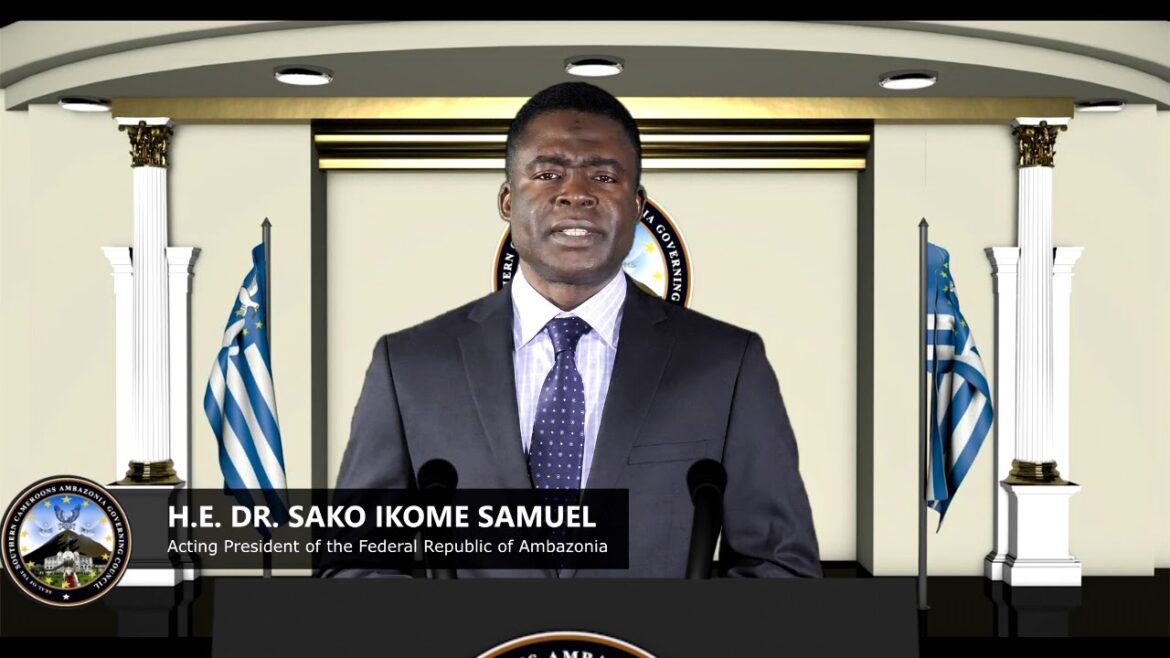- Says Biya Failed To Defeat Them Even When They Were Unarmed
- Signals Shift From “Aimless” Resistance To “High-speed” Advancement
In a defiant address marking the eighth anniversary of the escalation of the Anglophone crisis, Dr. Samuel Ikome Sako, President of the exiled Government of Southern Cameroons—also known as the Federal Republic of Ambazonia, declared outright victory over Cameroonian forces, asserting that President Paul Biya’s regime has been decisively defeated after failing to crush the independence movement even in its earliest, unarmed days.
“These State terrorists have lost the war!!” Sako proclaimed in his September 30 speech, at a press event, ahead of October 1, which they celebrate as Ambazonia’s Independence Day. He highlighted what he calls the regime’s initial arrogance in November 2017, when Biya labeled protesters “terrorists” and launched what Sako called a “senseless war of Assimilation,” expecting a swift resolution. Instead, eight years later, Sako said Cameroon’s military is “demoralized,” with thousands of soldiers deserted, dead, or suffering mental health crises, while Ambazonian self-defense forces who were once equipped only with “catapults and sticks”, now dominate the terrain as “among the best guerrilla fighters on the continent.”
“French Cameroon could not conquer you when you had nothing. What can they do to you now? Nothing!!” Sako told his supporters, framing the conflict’s next phase as diplomatic negotiations where “only integrity and uncompromising patriotism must speak.” He accused Cameroonian troops of targeting civilians through torture, rape, and extortion, citing recent atrocities in Bamenda, including corpses left near a Catholic hospital on September 12 and the killing of a taxi driver and pregnant woman during a high-speed chase on August 19.
The speech, attended by diaspora Ambazonians and streamed to supporters at home and abroad, also spotlighted a landmark organisational milestone: the inaugural session of the 2025 Ambazonia Stakeholders Constituent Assembly (ASCA), described by Sako as the “true people’s supreme organ.” Formed to consolidate the independence movement’s institutions amid what Sako called a “new era” following the symbolic completion of seven years of struggle, the ASCA overwhelmingly endorsed Sako’s continued leadership and adopted sweeping resolutions to push toward full sovereignty.
The assembly’s goals, outlined in the resolutions, emphasise a structured path to victory. Central to these is a blueprint for negotiations, a framework rooted in “justice, dignity, and self-determination” that prepares Ambazonians for talks with international partners. This includes the establishment of the Southern Cameroons/Ambazonia Diplomatic Commission (ADC) to equip a delegation—drawing on “civil society experts and competent patriots with clean records”—to avoid past diplomatic pitfalls.
Equally vital are commitments to transparency and accountability, ensuring ethical governance by weeding out “opportunists” and “infiltrators” so that only “tested patriots loyal to the cause” lead the movement forward.
The resolutions also focus on strengthening core pillars, including bolstering self-defense, diplomacy, and internal institutions to defend restored sovereignty “morally, intellectually, and territorially.”
A comprehensive roadmap for full independence forms another cornerstone, incorporating the first 100-day policies and actions to signal a shift from “aimless” resistance to “high-speed” advancement.
Finally, the goals underscore strategic unity, honoring precursors like Gorji Dinka and Prof. Carlson Anyangwe while warning against those who “started well but finished as traitors.” In this vein, the ASCA aims to unify refugees—hundreds of thousands scattered across Nigeria, Europe, and beyond—and civil society actors under disciplined leadership.
Sako announced plans to appoint a vice president and a small “competent, disciplined, loyal, and focused” working government in the coming days, underscoring that “leadership is not a trophy—it is a call to more sacrifice.”
Sako’s address also invited international partners to engage with Ambazonia as a “nation of gentlemen and ladies”.
In a direct challenge to the upcoming elections, Sako declared a total boycott in Ambazonian territories, calling for a “sit-at-home strike and lockdown” from October 2 to 14. He cited the polls as a “charade and provocation” used to incite violence and silence dissent.
Sako reserved special praise for the United States as Ambazonia’s “most trusted ally,” vowing continued engagement with U.S. institutions for a “peaceful and lasting resolution,” while dismissing the United Nations as a “do-nothing” body. He closed with a rallying cry on the 64th anniversary of the end of British trusteeship in 1961: “Let us journey to Buea as One People—United, Focused, and Unstoppable.”
By Andrew Nsoseka

